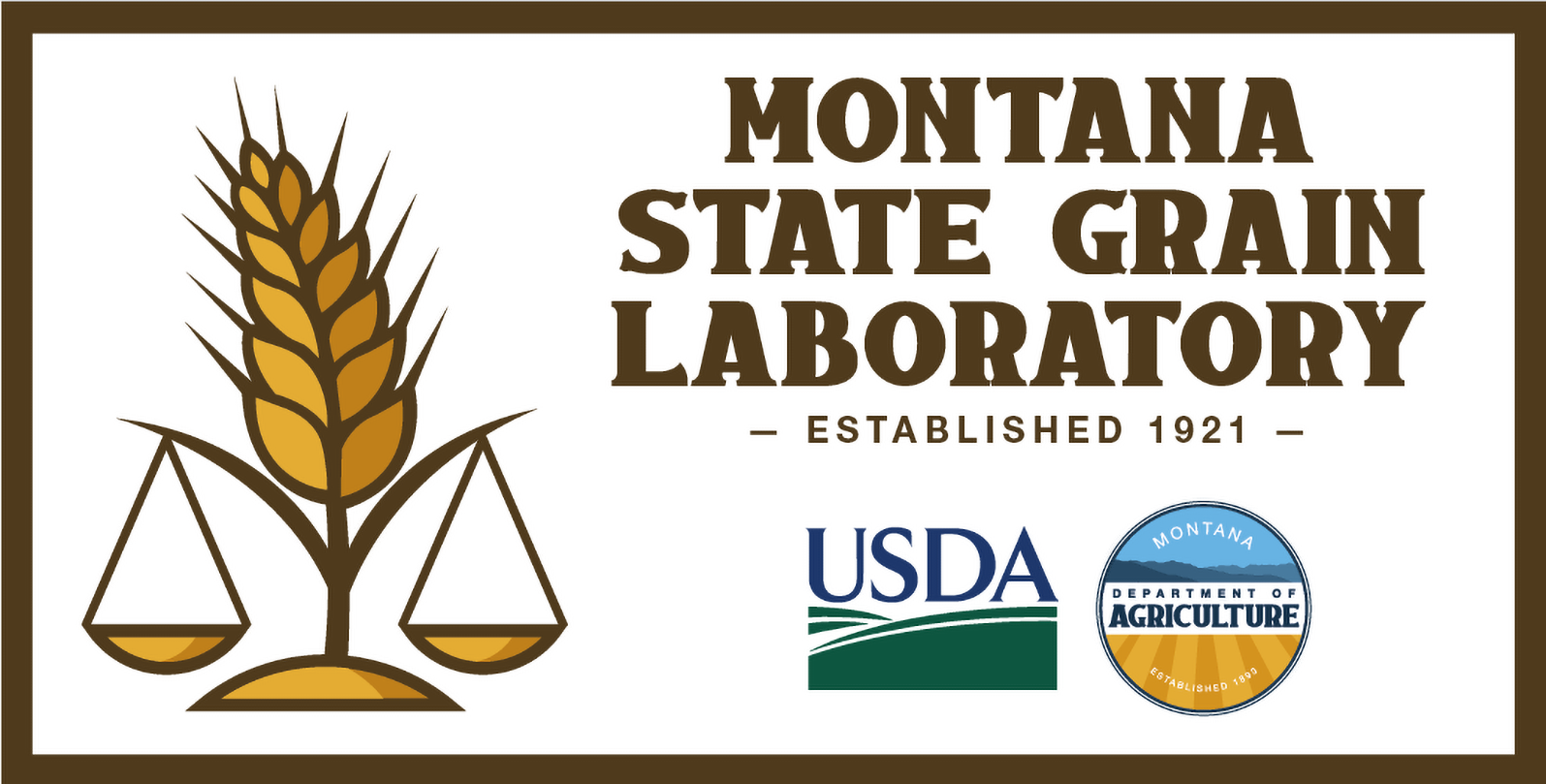Quality Assurance
USDA Official Agency Designation
 The Montana State Grain Laboratory, located in Great Falls and Plentywood, the labs are part of a nationwide network of official inspection agencies licensed by the USDA Federal Grain Inspection Service. Official USDA inspection results enable fair trade and access across all borders for grains and pulses.
The Montana State Grain Laboratory, located in Great Falls and Plentywood, the labs are part of a nationwide network of official inspection agencies licensed by the USDA Federal Grain Inspection Service. Official USDA inspection results enable fair trade and access across all borders for grains and pulses.
Online Certificates
Grade certificates are available online to allow quick delivery of results.
Mail Payments
Make checks to: Montana State Grain LabMontana Department of Agriculture
Montana State Grain Lab
PO Box 200201
Helena, MT 59620-0201
Submit Sample Address
As part of its efforts to promote Montana’s world class wheat and barley, the Montana Wheat and Barley Committee released the following video series to help prospective buyers and others understand the grain sampling and grading process from start to finish.
State Grain Lab Objectives and Procedures
The Montana State Grain Laboratory, located Administrative Rules of Montana 4.13.102 in Great Falls, operates within the guidelines set forth by the U.S. Grain Standards and the Montana Grain Standards Acts. The Montana State Grain Laboratory operations is monitored by the Federal Grain Inspection Service (FGIS).
To obtain official designation the laboratory follows criteria established by the FGIS, including:
- All employees must be examined and licensed by the FGIS for all functions they perform.
- Stringent record keeping methods must be utilized by all laboratory personnel.
- Four types of official grain certificates are made available to the grain industry.
- Adequate equipment and a sufficient number of personnel must be deployed in order to maintain an official designation.
- All records, equipment, and procedures must be available at all times for scrutiny by a Federal Compliance Team, which examines the Laboratory periodically.
Customers who use the official laboratory are assured the best analytical results determined by consistent methodology certified by the FGIS.
ObjectiveThe Montana State Grain Laboratory is one of three bureaus located within the Agricultural Development Division of the Montana Department of Agriculture. The sole function of the Montana State Grain Laboratory is to operate the grain testing laboratory to satisfy provisions of Montana law, which entitles all buyers and sellers of grain to an official grade, protein analysis and other quality tests on any grain delivered to a warehouse.
Laboratory personnel determine grain quality in an unbiased manner. Official grades are issued after applying correct procedures to the grain being tested. All tests are performed without pressure from either buyer or seller, and without knowing how the results might affect the final settlement of a particular grain transaction.
The Montana State Grain Laboratory operates on income that is generated from established fees for services rendered.
Accurate
Protein, grade and other quality tests are the basis of the price settlement between buyer and seller. The numerical grade of the grain is based on discounts of various factors such as shrunken and broken kernels, frost damage, germ damage, sprout damage and other degrading factors.
All equipment is tested for precision operation and accuracy on a regular schedule, regardless of the amount of use. Infrared equipment is calibrated daily.
Accuracy has been the mark of excellence of the Montana State Grain laboratory. The laboratory has received numerous awards over the past several years for its quality of work in cereal grains.
Accuracy is assured by the laboratory's objective position and the methodology of its official designation.
| Cereals | Pulse | Oil Seed | Specialty Crops |
|---|---|---|---|
| Wheat (all classes) | Green, Yellow and Mottled Peas | Camelina* | Mustard (all classes)* |
| Barley | Garbanzo Beans (Chick Peas) | Crambe* | Millet |
| Khorasan* | Lentils | Flax Seed | Black Hulless Barley |
| Hulless Waxy Barley | Navy Beans | Rapeseed | Spelt |
| Rye | Pinto Beans | Canola | Confectionary Sunflower |
| Triticale | Safflower* | ||
| Corn | Hemp | ||
| * Inspected and graded using State of Montana Standards |
Montana State Grain Lab Grading Standards
Federal Standards
The standards for commodities graded under U.S. Grain Standards Act (USGSA).
These commodities include:
- Wheat
- Barley
- Oats
- Rye
- Triticale
- Canola
- Flaxseed
- Soybeans
- Sunflowers
- Mixed Grain
Montana Standards
Several commodities are graded using Montana Standards. These grading standards are available as individual files listed below.
The standards for commodities graded under Agricultural Marketing Act (AMA) are found on the FGIS website.
U.S. Standards for Peas
U.S. Standards for Lentils
U.S. Standards for Beans
Accurate Bin and Truck Sampling
Very few fields of grain in Montana are totally level or uniform in quality. Lower areas have more subsoil moisture, higher bushel per acre yields and lower protein. Higher areas have less moisture, fewer bushels per acre and higher protein. Frost settles in low areas in a field resulting in non-uniform percentages of frost damage. Moisture creates higher percentages of sprout damage on the portion of a field that is the most mature. These conditions result in very few bins being totally uniform in quality.
It is extremely difficult to accurately sample a bin after it has been filled. Sampling a full bin with a sectioned or standard tier probe leaves large areas of the bin unsampled. This results in grade, dockage and/or protein results that often do not match results on delivered grain.
It is in the producer's and the elevator's best interest to negotiate grain sales based on accurate bin sample results. Producers and elevators both dislike the problems resulting from a difference in bin sample and unload results.
The most accurate way to sample a truck is with a compartmentized tier probe. Realizing this is impractical during harvest or in most elevator settings, following are some practical suggestions for accurately sampling a bin or truck.
- Pre-harvest planning, a five-gallon plastic bucket numbered for each bin or composite sample and a sampling device.
- Use an odor free sampling device to collect samples (scoop, can or cup)
- Sample each truck load according to size so the sample will represent the bin or lot of grain.
- A cut of the stream for every 100 bushels. Example: A 300-bushel truck three cuts, a 500-bushel truck five cuts or a 1,000 bushel truck 10 cuts. This will weight the sample by volume to represent the bin or lot of grain.
- The sampling device should be quickly drawn across the stream of grain from one side to the other without completely filling the device.
- As protein and quality can vary considerably in a bin or lot of grain, the sample should be thoroughly mixed.
- Hand mixing of a bin or composite sample does not achieve consistent accurate results. The most efficient way of mixing a sample is to utilize a divider/mixer. As most producers or elevators do not have access to a divider/mixer, the following methods work well.
- Place the bin sample on a tarp and thoroughly mix with a garden hoe.
- Pour the elevator composite sample from one container to another, approximately 10 times.
Suggestions for Sampling Bins
To sample bins that are full use one of the following two methods:
Section Probe
Probe grain at the inspection cover and if possible at the center of the bin adding sections until the probe has been pushed into the grain as far as possible or the bottom of the bin is reached. If it is only possible to sample at the inspection cover probe in different directions to acquire grain from different locations in the bin.
Tier Probe
Probe grain at the inspection cover and if possible at the center of the bin. Also take one probe through the augur hole to draw a portion of the sample from the bottom of the bin. If it is only possible to sample at the inspection cover probe in different directions to acquire grain from different locations in the bin.
Hand mixing of a bin sample does not achieve consistent accurate results. The most efficient way to mix a sample is to use a divider/mixer. As most producers do not have access to a divider/mixer the following methods work well.
- Place the bin sample on a tarp and thoroughly mix with a garden hoe.
- Pour the bin sample from one container to another at least ten times.
If producers do not have access to a sectioned or a tier probe they can usually borrow one from their local elevator. The State Grain Laboratory is available to assist any producer with advise or information on bin sampling. If producers are located close enough to the State Lab, we would be willing to loan you a probe to use for sampling your bins.
General Provisions
Effective Date: The effective date of this rule is January 01, 2024.
General Provisions: These General provisions applying to all sections of this rule are as follows:
Service Hours: Normal office hours are 8 a.m. to 5 p.m. Monday through Friday. All other hours and holidays will be considered overtime.
Sampling Hours: Sampling hours are 8 a.m. to 5 p.m. Monday through Friday. An applicant must place service requests with the inspection office by 10:00 a.m. during regular hours for same day inspection/sampling service. All requests for sampling services to be performed outside of normal business hours must be received by 2:00 p.m. of the preceding business day. Sampling services requested to be performed outside of normal office hours, including holidays, will be charged overtime.
Regular Hourly Rate: The regular hourly rate for travel time and stand-by fee is $60 per hour per individual assessed in half-hour intervals with a minimum of two hours charged.
Overtime and Holiday Hourly Rate: Overtime and holiday hourly rate is $90.00 per hour per individual assessed in half-hour intervals. A minimum four-hour charge will be assessed except when before or for a continuation of a regular workday, then actual overtime hours will be charged.
Holidays: Holidays are as adopted in 1-1-216, MCA. (e.g., New Year’s Day, Martin Luther King Day, Presidents’ Day, Memorial Day, Independence Day, Labor Day, Columbus Day, Veteran’s Day, Thanksgiving Day, Christmas Day, and State Election Day).
Mileage and Travel Fees: Mileage, travel time, and travel expenses are as follows:
Mileage Fee: Mileage charges shall be assessed per Title 2, chapter 18, part 5, MCA for state employees which is equal to the United States Internal Revenue Services (IRS) mileage allotment. Any change to the mileage rate is effective when the IRS changes their standard mileage rate. The mileage charges will be prorated where possible.
Hourly and Overtime Rate: For each trip requested, the applicant will be charged at the regular hourly rate, except when work is conducted while in overtime status or on holidays. Work conducted while in overtime status or on holidays will be charged at the overtime rate, prorated where possible.
Travel Expenses: Travel expenses (as defined by Montana Operations Manual Travel Policy) including but not limited to per diem, lodging, and mileage will be assessed to the applicant in addition to other fees and charges.
Staffing: Montana State Grain Lab will determine the number of personnel to properly provide the service requested. To assure personnel safety, Montana State Grain Lab may suspend sampling services due to inclement weather conditions as well as sampling rail cars at night with insufficient lighting, or other potentially hazardous conditions.
Observation: In order to provide official services, Montana State Grain Lab must be physically able to observe elevator personnel sampling and/or sealing a railcar.
Miscellaneous Fees:
Postage: Actual postage or delivery service charges will be added to sampling and other fees.
Special Requests: Requests for services not covered by this rule will be performed at the applicable hourly rate stated herein plus mileage and travel charges, if applicable.
Sanitation Inspection: A base fee of $120.00 will be charged per inspection in addition to the applicable hourly rate stated herein plus mileage and travel charges.
Diverter Inspection: A base fee of $120.00 will be charged per inspection in addition to the applicable hourly rate stated herein plus mileage and travel charges.
Base fee is $600.00 for certification of new diverters.
Retest/Reinspection:
Retest/Reinspection based on a File Sample: Will cost the same as the original test/inspection.
Retest/Reinspection based on a New Sample: Will cost the same as the original inspection and sampling fees.
Export Documentation Request: Processing and handling fee for sample preparation and export documentation.......... $9.00 per request.
FGIS Administrative Tonnage Fees: In addition to all other applicable fees, FGIS administrative tonnage fees for export grain shipments inspected and/or weighed, excluding land carrier shipments to Canada and Mexico, will be assessed at the current per metric ton rate identified in FGIS Directive 9180.74 Service Fees and Billing Codes, Attachment 1. Invoices will identify assessed administrative tonnage fees as separate line items per applicable carrier/unit type.
FGIS USGSA Supervision Fees: In addition to all other applicable fees, FGIS supervision fees for domestic U.S. grain shipments inspected and/or weighed, including land carrier shipments to Canada and Mexico, will be assessed at the current per metric ton rate identified in FGIS Directive 9180.74 Service Fees and Billing Codes, Attachment 2 . Invoices will identify assessed supervision fees as separate line items per applicable carrier/unit type.
FGIS AMA Cooperative Service Fees. In addition to all other applicable fees, commodity cooperative service agreement fees for commodity inspection services (pulses, hops, and miscellaneous processed commodities), excluding rice, will be assessed at the current percentage rate identified in FGIS Directive 9180.74 (Service Fees and Billing Codes, Attachment 4.) The assessed fees must exclude travel, mailing expenses, and state and local taxes. Invoices will identify assessed commodity cooperative service agreement fees as separate line items.
Payment of Fees and Charges: All department fees and charges for services rendered are due within thirty days of the statement date. Finance charges of $30.00 per month shall accrue on any balance owed after thirty days of the statement date. If the department does not receive payment within thirty days: Services may be withheld until the delinquent account is paid; or cash payment for subsequent services may be required.
--- End of General Section ---
Grain Lab Staff
Phone Numbers
Phone (Great Falls) : (406) 452-9561
Phone (Plentywood) : (406) 765-1005
Great Falls
Director,
Administrative Specialist,
Administrative Assistant,
Quality Assurance Specialist,
Lab Coordinator,
Ag Inspector,
Ag Inspector,
Ag Inspector,
Ag Inspector,
Ag Technician,
Plentywood
Lab Supervisor,
Ag Inspector,
Ag Technician,
- Montana AMA Fees
- Montana Standard Fees
- Montana USGSA Fees
- Buckwheat: Grain Inspection Handbook Montana Standards Book 1 -Chapter 4
- Camelina: Grain Inspection Handbook Montana Standards Book 1 – Chapter 5
- Crambe: Grain Inspection Handbook Montana Standards Book 1 – Chapter 9
- Hulless Barley: Grain Inspection Handbook Montana Standards Book 1 – Chapter 6
- Khorasan: Grain Inspection Handbook Montana Standards Book 1 – Chapter 8
- Mustard Seed: Grain Inspection Handbook Montana Standards Book 1 – Chapter 1
- Not Standardized Grain, Commodity or Processed Commodity: Grain Inspection Handbook Montana Standards Book 1 – Chapter 11
- Rapeseed: Grain Inspection Handbook Montana Standards Book 1 – Chapter 3
- Safflower Seed: Grain Inspection Handbook Montana Standards Book 1 – Chapter 2
- Spelt: Grain Inspection Handbook Montana Standards Book 1 – Chapter 7
- Producers' Rights Notice - Montana State Grain Lab



